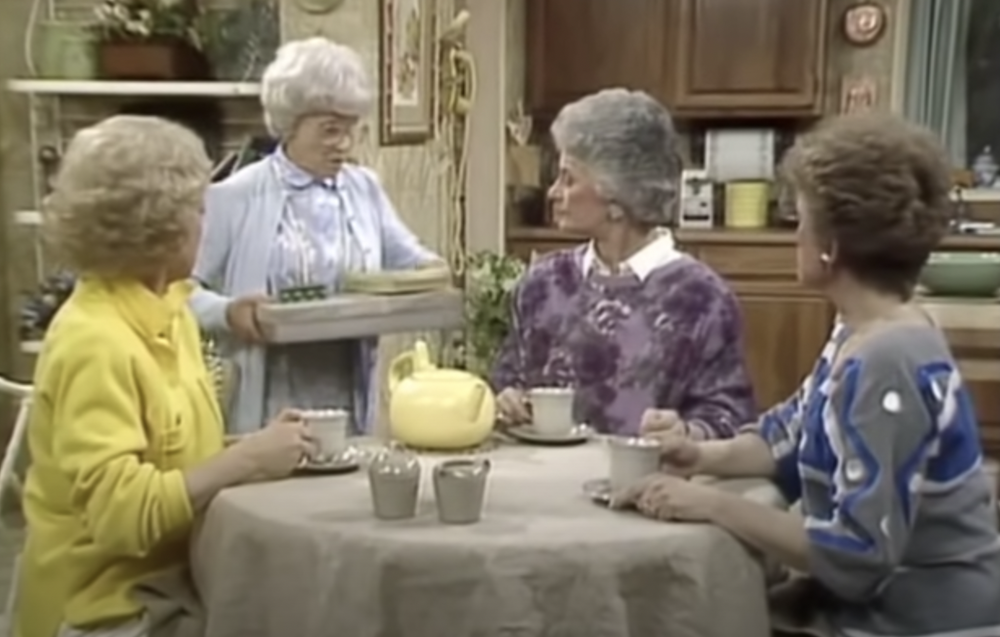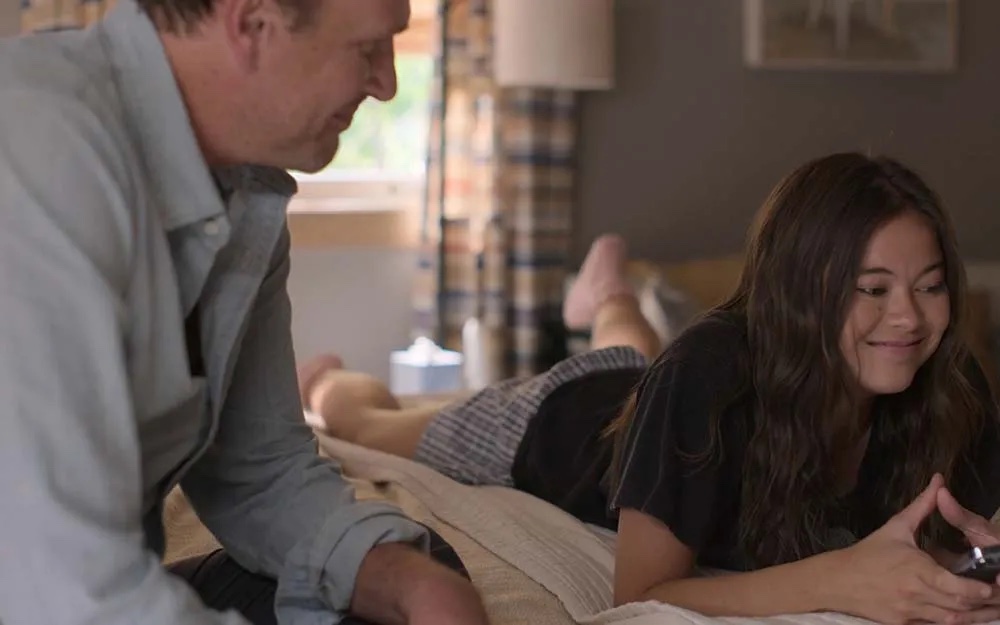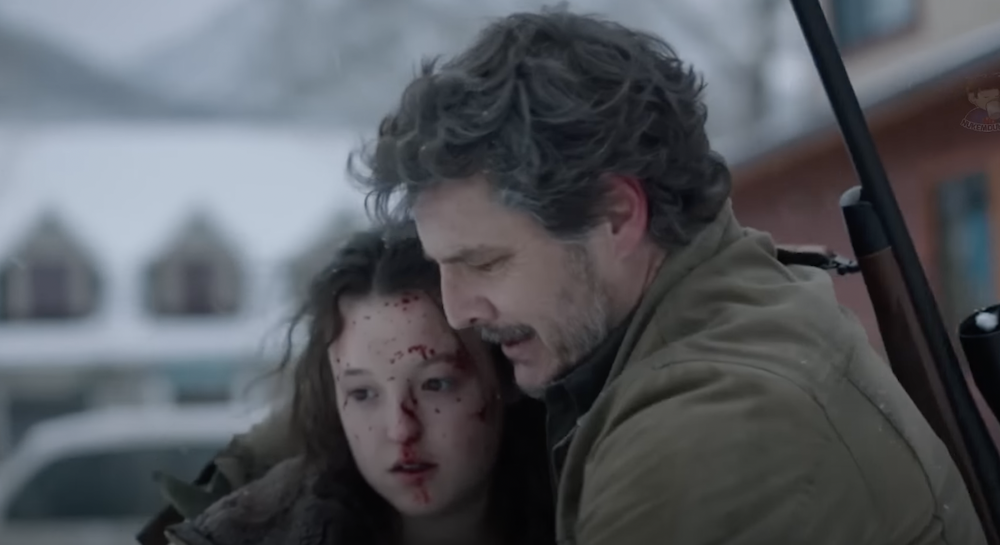Books & Culture
Worshipping at Jerry Springer’s Daytime Altar
Watching the show with my great-grandma taught me the basics of storytelling

“Girls don’t play baseball,” Will said. He kicked a footful of the playground’s pea gravel at me when I tried to join the boys for a game.
I was less mad about Will––he’d always been a bully, so it was unsurprising. I was mad at Andrew, Will’s friend, who everyone knew had let me play baseball with them last week when Will was out sick because I was the fastest girl in our class. Even if I could only bunt, I could sprint to third base before anyone had even figured out where the ball went.
So I looked at Andrew and called it like I saw it. “You son of a bitch,” I hollered, eyes flicking to Will so he’d know I meant him too.
“Oooooh, I’m telling!” Will said before running off to the teacher’s bench.
I came to kindergarten with an extensive vocabulary for a little kid. One that allowed me to use inconspicuous and approximately correctly in a sentence. One that also allowed me to use shit fire, damnit, son of a bitch, and stupid-ass cocksucking motherfucker correctly in a sentence.
“Where’d you learn to talk like that?” my teacher, Mrs. England, asked, concern creasing her brow.
Accustomed to being praised for my vocabulary, I answered proudly: “My great-grandmother! We watch Jerry Springer in the afternoons when I get home from school. I learn new words every day!”
Nona was 72 years my senior––and I mean 72 years to the day. She was fond of telling everyone, especially the cloyingly sweet cashiers at the Piggly Wiggly who asked “And who’s this darling little girl?” “That’s my great-grandbaby. Borned on my birthday!”
She’d hold her head high, her straight white bob with the ends curled under coming loose from behind her ears as she nodded proudly. Then she’d pat my arm and her pink tourmaline and opal rings––our birthstones––would spin around the bony part of her finger between the knuckles.
We were enough alike in spirit that we might have been born 72 years apart right down to the hour.
Though I never lived in her house, Nona raised me. She was the only adult in my life who gave me plenty of attention. Everyone else seemed like they were too busy, tricking me into playing by myself so they could nap or do housework. Or better yet, tricking me into playing a game whereby I laid in bed with my eyes closed and tried to see how long I could be quiet, in an attempt to make me fall asleep so they could do something else.
Nona was the only one who never tired of me. Her house an island unto itself and her wrinkled, sagging arms wrapped around me as we sat in front of the TV, a refuge.
Nona saw no reason to give up watching Jerry in the afternoons just because I might get some creative ideas about the world.
She lifted the veil of her adult world and welcomed me in. Rather than shutting me out of the things she liked, she introduced them to me without shame. I was her ingénue. We ate banana pudding, listened to the AM station that played Cajun music at night and danced polka. She taught me to gamble with her friends. We danced along to The Lawrence Welk Show and shook our fists at the cheating men on Divorce Court. And my favorite: cursing all hell and creation while watching Jerry Springer.
The first episode of The Jerry Springer Show aired in 1991, less than a year after I was born, so to say I grew up watching is no exaggeration. Nona was retired by the time I came along, so she was my daily childcare after school. Something about the show riveted her and by the time I got old enough to recognize some of the words and know adults fighting was wrong, she’d been hooked for years. Even with the title card at the top of each episode warning that the content may not be suitable for children, Nona saw no reason to give up watching Jerry in the afternoons just because I might get some, ahem, creative ideas about the world.
I don’t remember my first episode of Jerry Springer, but I remember my last.
A few months ago I discovered full-length episodes on YouTube. Missing my Nona, I watched them in her memory. The stories were what I’d remembered: a woman cheating on her boyfriend, who loved her oh-so-much and wanted to marry her, with his best friend. A man cheating on his new wife with his coworker who’s gay. People who can’t decide between multiple partners and cry onstage while all the jealous partners, who just found out about each other, attempt to duke it out around the guards.
And that was just one episode.
While this happens, Jerry stands off to the side, observing the action and only occasionally stepping in to comment or ask a question. Somehow, amid the chaos, Jerry’s quiet demeanor demands attention––the fighting halts abruptly and all eyes, including those filled with fury only moments before, calm under Jerry’s spell. Jerry seldom takes sides, preferring instead to ask clarifying questions to make these enraged, heartbroken people see the flawed logic that caused their misery.
“You busted out the headlights to his car? Why?”
“So you had sex with a pregnant stripper. Then what happened?”
“I understand you’re angry and you have reason to be angry, but are you saying you’ve decided that you don’t want to marry her?”
“Now she’s saying she doesn’t want someone who only wants to have slow sex. She’s saying she wants you to pull her hair. What do you think about that?”
“But you’re still not sure that she stole the money, right? Because who told you that?”
“He’s outside the studio now, but why don’t we bring him in and you can tell him?”
In his mysterious way, Jerry gently leads them to see the error of their ways and guides them toward a more righteous path. To these people who don’t respect anyone––not their partners, not their parents or friends, and least of all themselves––Jerry Springer commands respect.
Jerry reigns over his guests, a god on his mount.
The Jerry Springer Show is oddly egalitarian. The stereotype of the people who take its stage is that they’re all trashy, poor, and ignorant. Otherwise, why seek help on national TV, airing the intimacies of their miseries for the nation to consume? But within the perceived trashy/poor/ignorant umbrella, you find people of all ages, all colors, all religions, and all political leanings.
And Jerry reigns over them, a god on his mount. He’s an embodiment of the Christian god of judgment; the coyote trickster god of Native Americans; Hermes, the Greek god of sport; and Anansi, the West African god of story. A god of many faces for his many subjects––a form of equity in itself.
I’d like to think Jerry started the show as a way to help people or at least give them a marginally safer outlet to share their grievances. Who can say but the former episode stars with their 15 minutes of fame in tow?
The theatrics are enacted in front of a crowd of people who are there to gawk and ridicule the pain of those onstage. While some audience members have followed Jerry’s lead and asked thoughtful fquestions, the audience is known to shout for women to lift up their shirts to expose their breasts, as well as challenging men to fistfights.
Nona cheered the fighters, picking the ones she thought were justified in winning or, if they were both atrocious, wanting them to knock each other out. But she almost always shook her head in disapproval at the boob-flashing women, perhaps sensing the exploitative and unfair nature of the demand. After all, men were not asked to flash their penises (though some chose to moon the camera). Each case functioned as a measurement of masculinity or femininity. The “real men” could hold their own in a fight and the “real women” had conventionally attractive breasts. Meaning, ones that weren’t deemed too small to be worth showing, else they would be booed by the audience.
At least the women, whether applauded or not, were rewarded with shiny plastic Jerry beads––a pittance if you asked Nona.
“Don’t you never go pullin’ your shirt up like that,” she told me, shaking a knobby finger in my face. “Just ‘cause mens ask don’t mean it’s worth it.”
I nodded, though at the time when my breasts were still a few years off, I couldn’t imagine anyone wanting to see anything I had.
Jerry is the ringleader in the circus tent of his domain, though he often chooses to stand by as a neutral third party, relinquishing his power to the guest who creates the most spectacle. He makes people think they’re running the show when it’s him pulling the strings.
At the end of the day, Jerry’s loyalty isn’t to the people onstage, the live audience, or the people watching on the other side of their TV screens––it’s to the story.
At the end of the day, Jerry’s loyalty isn’t to the people onstage, the live audience, or the people watching on the other side of their TV screens––it’s to the story. He channels Anansi, prying information out of the show’s guests, even when he knows the revelations will hurt the people affected by them. Because it’s information, especially when its release is timed to hold the audience’s interest, that spins the tale.
The audience will chant Jerry’s name, pounding their fists into the air: Jer-ry, Jer-ry, Jer-ry––a prayer to their deity. And perhaps––after managing the emotions of fifteen or twenty adults who, in theory, should know how to behave––he does deserve an affirming cheer.
Jerry is an angry god looking down on the world’s destruction from his position on high and doing nothing. Only putting the histrionics on display and judging them for it.
Born in 1918 in Alabama’s Bible Belt, Nona could hardly conceive of a world without religion. Her family went to church, her friends went to church, and the boys she wanted to date, among them the man she would marry, went to church. The sanctuary held the social fabric of her society together––until, in her old age, widowed, and friends frail if not dead, she stopped attending. She never liked it anyway.
It was around that time she found daytime television, specifically the curly haired ash blonde former mayor of Cincinnati with his modest smile and wire rim glasses. Better than any televangelist, he held Nona enraptured––not with promises of eternal life, but eternal entertainment. For some, that’s just as good.
During Jerry’s Final Thoughts, Nona would nod along, giving claps of approval, and yelling “preach!” and “amen!” She worshipped at Jerry’s altar: her TV stand his pulpit, her recliner a private pew, his ending incitement to “take care of yourselves and each other” a commanding dismissal not unlike being called to share the good news.
Jerry has seen it all. If you watch enough episodes, you will too.
You’ll learn just how many different kinds of stories and people there are. Even without the nuance and subtlety that skillful writing requires, you’ll see the bare bones and master how to erect the scaffolding of story. That’s the kind of thing they don’t always teach you in elementary school. The kind of thing a kindergartner, with the blessing of her great-grandmother, might learn from Jerry Springer.
Even without the nuance and subtlety that skillful writing requires, you’ll see how to erect the scaffolding of story.
When asked about the success of the show, Jerry told People, “If I had to guess, for so many of our guests, no one ever asks them a question. They live their whole lives—they don’t have kids who ask them their opinion, they don’t have parents who ask them their opinion, they’re not in a job where their opinion is valued… For one day in their life, people are really paying attention. They’re talking about something that is important to them. We take it for granted.”
To tell a story is to detail conflict. There is no perfect, harmonious story; there’s no story without strife. Legends are not born of happiness. Myths are not made of contentment. The cruelest gods make the best bards.
I can’t say whether the people who appear on the show feel better afterward or whether their lives tangibly improve. Many, I’m sure, go back to the middle class lives they abandoned for the day. In interviews, Jerry has mentioned how he started the show to cover serious discussion topics and give people a voice who might not otherwise have one, but eventually, in a grab for ratings, the show morphed into what we know it as today.
I want to believe Jerry doesn’t intentionally exacerbate the suffering of the people who entrust him with their dramas, though the show is long rumored to be fake and a ploy for ratings. There was a rumor that Jerry would recruit people from the audience to play a part. You, you’re going to be the pregnant stripper. You’re going to be the Klan member. And you, you’re going to play the cheating boyfriend. (Is that not the job of a god? To assign people arbitrarily to the conditions of their lives?)
Admittedly, the thought of the show being fake never occurred to me until adulthood. Nona swore the family that lived around the corner from her had been on the show––something about a cheating husband making illegitimate children all over Jefferson County. They were real. I saw the fiercely muumuu-ed and red-faced matriarch of the family getting her mail and taking their poorly shaved poodle out when I went to Nona’s house. The woman gave my mother a fur coat once––too hot for the mild Alabama winters and, broke as she was, rumored to have been bought with money she got from being on The Jerry Springer Show.
The writer Scott McClanahan said, “I never look at a painting and ask, ‘Is this painting fictional or non-fictional?’ It’s just a painting.”
Jerry Springer is just a show. Nona said it was real and I believed her. That was all I cared about.
Though the viewer never wants to imagine someone like them––us! YOU!––darkening that stage door, in the nearly 4,000 episodes in its 27 seasons, the likelihood is that there is someone just like you who’s either been confronted or doing the confronting under Jerry’s tutelage.
The show parades in front of the rest of the country the painful truths it would prefer to ignore. It feeds on the need of the privileged to point at those they deem beneath them and say “at least I’m not as bad as that.” Whatever their problems, the privileged can deal with them quietly. Whatever their problems, they’ll be handled away from morbid curiosity and prying eyes. Whatever their problems, they can rest easy knowing they will never appear on the mirror of humanity that is The Jerry Springer Show.
This is how I believe Nona understood the show too. No matter our family’s dysfunctions––and we had dysfunctions a-plenty––we had the good sense to deal with it in-house, never alerting the outside world. Unconsciously, this is how I understood the show too. Between my own family and the backwoods Alabama community I was raised in, it didn’t seem far-fetched that I might grow up to become like the people on the show, perhaps even gracing its stage myself. My family insisted on keeping its problems quiet mostly by pretending they didn’t exist, and I fantasized about calling Jerry to confront them all and, for once, forcing them to listen to me and acknowledge their failures.
If the fantasy of me confronting my family onstage (everyone except Nona, of course) were to come true, I didn’t know back then what I’d have even said. I imagined myself being struck dumb, unable to think or speak, then spending a lifetime thinking of what I should have said.
The Jerry Springer Show works best for drama where there’s a clear right and wrong, or where both parties are wrong. With only 43 minutes of airtime to each episode and each episode being divided up into three or four segments, the show doesn’t have the time or space for nuance. The show has no room for subtlety––no grievances for emotional or psychological abuse, only tangible things like cheating, physical violence, or just plain getting tired of somebody.
The most intriguing part of the show is perhaps not the dramas played out onstage, but rather the last two minutes of the episode in which Jerry shares his “Final Thoughts.” Offstage, removed from the action, Jerry comments on what the viewers at home just watched. He blames people for not knowing what they want, not communicating well, having too many partners, being unreasonable in their desires, or any number of things he sees as moral and societal failings. Often he makes comments about social responsibility respectability politics like, “You can’t always trust someone who says they love you,” and “You have to be responsible for your actions,” and “If you keep repeating this pattern, you’re going to get hurt again.” It’s a modern-day Aesop’s Fables; an easy ending to a surprisingly complex show.
Jerry also taught me how not to tell a story; to avoid the cowardice of silence at the most crucial moments.
As Nona watched Jerry religiously, so too did I when I went over to her house after school. When I got too big to sit in her lap, I’d sit at her feet. And when she deemed my fine motor skills developed enough, she’d ask me to pluck her chin hairs during the commercial breaks or empty her spit can. If I was lucky, there’d be an alcoholic on the show and Nona would rant and rave about her late husband, my great-grandfather who died before I was born, making it sound like his litany of offenses had happened just yesterday.
Jerry also taught me how not to tell a story, to avoid the cowardice of silence at the most crucial moments and to make myself uncomfortable by confronting the people and situations I need to face, rather than hiding behind a stage door after the action has played out. All the while, Jerry Springer taught me how to hold people captive with story. To know when to insert myself in the action and when to take a more distant look.
Nowadays when I watch clips of the show on YouTube, trying to evoke Nona’s memory, I find myself cringing. I’m unable to un-see and un-know what eluded me when I was a kid. Rather than being able to appreciate the storytelling aspect, I find myself speculating. Don’t they know they’re going to have to go back to their normal lives where the fact that they were on Jerry Springer will be prefaced before anything else about them from now on? I knew this from Nona, who in her old age, riddled with dementia, had forgotten her neighbor’s name, but continued to refer to her as “you know, the one who was on Jerry Springer.”
The raw melodrama, the unashamedly confessional nature of it all makes me fidget in my seat––not with shock, but with people’s ready willingness to do something that much of the world would find humiliating. And yet, do I lay out my traumas (and occasionally that of other people) on the page for the benefit of others’ morbid curiosity? I dare you to show me a storyteller who doesn’t.
As the bar for what’s appropriate gets lower, conversely, so does the ability of the show to shock its viewers. They’ve seen these horrors before. How many ways of suffering can one extract from the human condition? It seems appropriate that after 27 years on air, the show would end during the Trump era, when the very shock factor Jerry thrives on is all too abundant.
In the end, The Jerry Springer Show is a tribunal and Jerry is the judge presiding over the people’s court. The cases brought before him are those you can rarely sue over in a court of law, yet the need for justice remains.
This likening of Jerry to judge is not lost on his network, NBC Universal, which recently announced that Judge Jerry, a courtroom drama starring Jerry where he’ll draw from his J.D. degree and experience working in law firms pre-politics and TV, is set to air in fall 2019.
And who are judges if not the gods of the earth.
I’ll be watching Judge Jerry on my lunch break, in my own recliner, thankful for the ability to work from home, and wishing Nona was still here to see Jerry in his final iteration come full circle: the Christian god of judgment. I may even watch as religiously as we used to and imagine her smiling down at me, happy she converted me after all.








